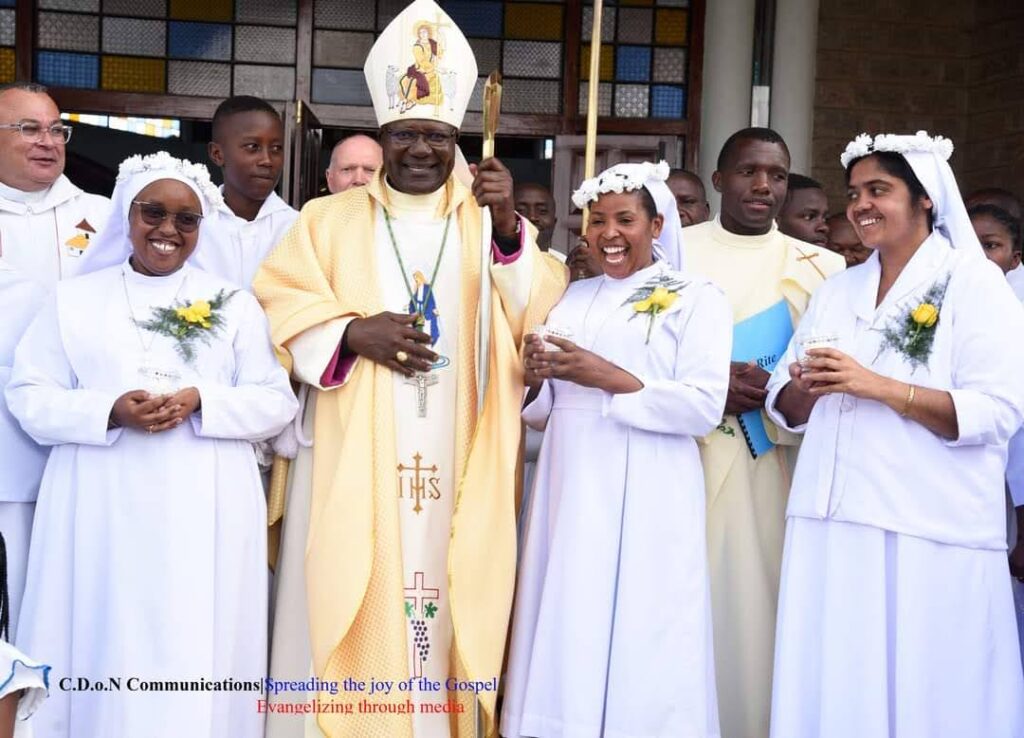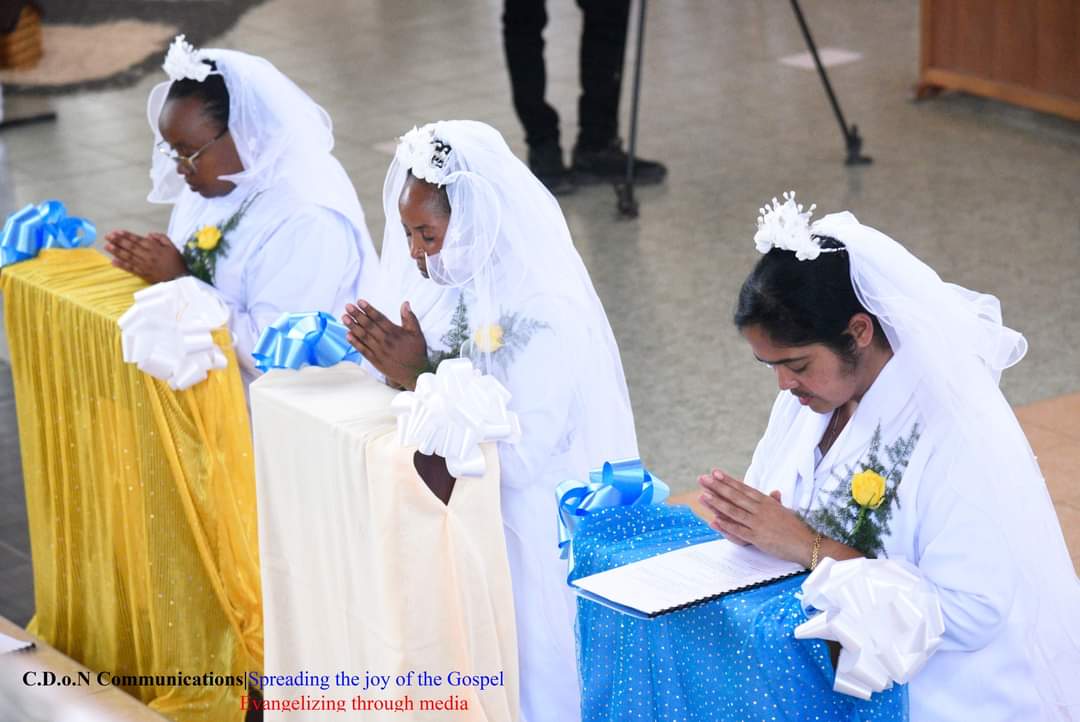KENYA: Ngong Diocese Consecrates the First Three Local Women to Perpetual Virginity Life “in the World”

Bishop John Oballa of Ngong Diocese Flanked by the Newly Consecrated Perpetual Virgins in the World
By Elizabeth Asasha
In a sequent commemoration of the Solemnity of Mary Mother of God on Monday, January 1, 2024, the Catholic Diocese of Ngong witnessed a unique ceremony in which three local women devoted themselves to a lesser-known vocational life of perpetual virginity lived within the world (Order of Consecrated Virgins Living in the World).
In a relatively new vocation on the African continent, distinct from traditional religious vocations, three professional women, Elizabeth Thomas, Catherine Muema, and Claire Daphney, chose to remain virgins and by a divine calling, sought to consecrate their virginity for the apostolate, fervent prayer, and works of penance and mercy.
Pledging a life-long fidelity to Christ, their distinction lies not in external signs, but in their actions, love, joy, and readiness to serve, much like the blessed Virgin Mary, who lived her consecrated virginity discreetly while attending to her daily activities.
In his homily, Ngong Diocese local ordinary, Rt. Rev. John Oballa Owaa explained that God called the trio to a closer union with Himself and dedicated service to the Church and humanity while urging the three to contemplate the profound impact they could have through prayer, benevolent deeds, and the blessings they can obtain for the Church, society, and their respective families.
“The life they seek to follow has its home in heaven,” the Bishop remarked at St. Joseph Cathedral in Ngong. “You have been called to a life of Holiness.”
Bishop Oballa exalted the three women as a sign of the great mystery of salvation proclaimed at the genesis of human history and fulfilled in the marriage covenant between Christ and His church.
The Prelate further emphasized the significance of the consecration, symbolized outwardly by the veil and ring presented to the three women, and encouraged them to uphold their vocation and dignity by emulating the humility and faithfulness of Mary Mother of God saying, “Through you, the Church’s motherhood of grace bears its abundant fruit, therefore imitate the mother of God.”
“Desire to be called and to be the handmaid of the Lord, preserve the fullness of your faith, the steadfastness of your home, the singleheartedness of your love, be prudent and watch like those wise virgins, keep the glory of your virginity uncorrupted by pride, your second name should be humility.” Impetrated the Bishop.
He handed them the liturgy of the hour’s prayer book, urging them to cultivate their love for God through the Eucharist, self-denial, scripture study, tireless prayer, and acts of mercy, “Let your thoughts be on the things of God,” he advised, emphasizing the importance of fervent prayer for the spread of Christian faith and unity among all Christians.

As apostles in the Church and the world, the bishop reminded the consecrated virgins of their duty to serve others, especially those in need. He then commissioned them to be a beacon of light, embracing everyone with love and care, and striving towards the unity of all things in Christ.
In a solemn entreaty, the bishop said, “Love everyone without discrimination especially those in need, you live among the people with the people, share in their concerns and their sufferings and come into their assistance.”
“Help the poor, care for the weak, teach the ignorant, protect the young, minister to the old, bring strength and comfort to widows and all in adversity. You have renounced marriage for the sake of Christ. Your motherhood will be a motherhood of the spirit as you do the will of your Father and work with others in a spirit of charity so that a great family of children may be born or reborn to the life of grace. Your joy and your crown even here on earth will be Christ.” He echoed.
In his concluding remarks, Bishop Oballa challenged the consecrated women never to forget their commitment to the service of the Church and all humanity. Their joy and crown, he asserted, would be found in Christ, as they contribute to the birth and rebirth of a great family of children to the life of grace.
In the Catholic Church, a consecrated virgin is a woman who has been consecrated by the church to a life of perpetual virginity as a bride of Christ. Consecrated virgins are consecrated by the diocesan bishop according to the approved liturgical rite.
In 1970, Pope Paul VI reintroduced the rite of consecration of virgins for women living in the world, following the Second Vatican Council and modeled on the ancient practice of velatio virginum that dates back to the Apostolic era, particularly the early virgin martyrs. The ceremony has continued throughout history and been bestowed upon nuns as they made their final vows without interruption using various forms at different periods.
A woman who chooses to consecrate herself as a virgin has the option of living her consecrated life in two distinct ways: within the confines of a monastic order as a nun or “in the world” under the authority and guidance of her bishop, all while dedicated to the service of the Church.
The first option involves becoming a nun within a monastic order. In this setting, the consecrated virgin would join a community of religious women who share a common way of life, residing together in a convent or monastery. Within the structured environment of the order, these consecrated virgins lead a life of prayer, contemplation, and service, adhering to the specific spirituality and charism of their religious community.
The second option, often referred to as living “in the world,” allows the consecrated virgin to remain within her local community and engage with society at large. Under the authority of her bishop, she lives a life consecrated to God, committed to prayer, apostolate, and works of mercy, while still participating in the everyday aspects of secular life. Unlike nuns in a monastic order, these consecrated virgins do not live in a communal setting but integrate into society, holding professions and engaging with the broader community.
In both cases, the common thread is a profound commitment to a life of virginity dedicated to Christ and the Church. Whether within the structured environment of a monastic order or
integrated into the secular world, these consecrated virgins play a unique and important role in expressing the values of faith, service, and dedication within the Catholic Church. Their choice reflects a deep spiritual commitment that transcends the conventional paths of religious life, emphasizing the diversity of vocations within the Universal Catholic Church.
The Code of Canon Law and Pope John Paul II Apostolic Exhortation Vita Consecrata, published in 1983 and 1996 respectively, provide insight into the Order of Virgins (Ordo Virginum). As an emblematic manifestation of the church as the Bride of Christ, this order has grown significantly over time with records from numerous dioceses indicating that approximately 5,000 consecrated virgins were residing across various regions globally by the end of 2018.


